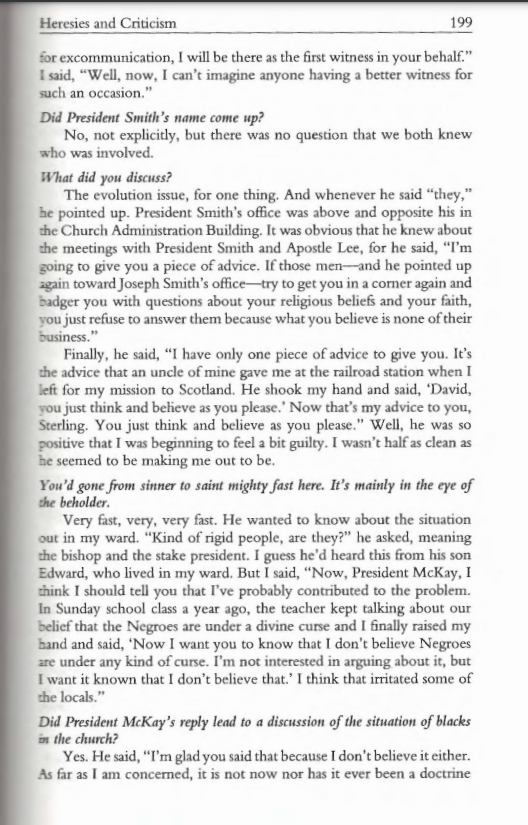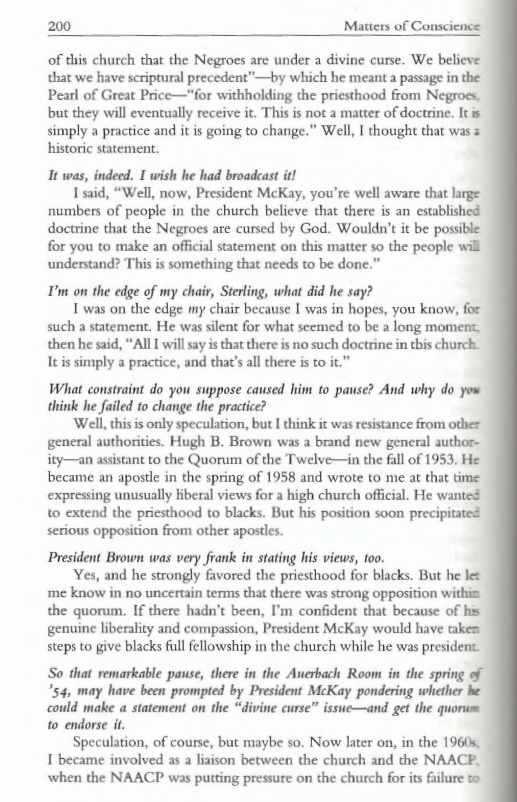David O. McKay describing the priesthood and temple ban as a practice rather than a doctrine, as reported by Sterling M. McMurrin.
- Type
- Book
- Hearsay
- Scribed Paraphrase2nd HandReprintLate
- Reference
Sterling M. McMurrin and L. Jackson Newell. Matters of Conscience: Conversations with Sterling W. McMurrin on Philosophy, Education, and Religion (Salt Lake City, UT: Signature Books, 1996), 199–200
- Scribe/Publisher
- Signature Books
- Audience
- General Public
- Transcription
You'd gone from sinner to saint mighty fast here. It's mainly in the eye of the beholder.
Very fast, very, very fast. He [David O. McKay] wanted to know about the situation out in my ward. "Kind of rigid people, are they?" he asked, meaning the bishop and the stake president. I guess he'd heard this from his son Edward, who lived in my ward. But I said, "Now, President McKay, I think I should tell you that I've probably contributed to the problem. In Sunday school class a year ago, the teacher kept talking about our belief that the Negroes are under a divine curse and I finally raised my hand and said, 'Now I want you to know that I don't believe Negroes are under any kind of curse. I'm not interested in arguing about it, but I want it known that I don't believe that.' I think that irritated some of the locals."
Did President McKay's reply lead to a discussion of the situation of blacks in the church?
Yes. He said, ''I'm glad you said that because I don't believe it either. As far as I am concerned, it is not now nor has it ever been a doctrine of this church that the Negroes are under a divine curse. We believe that we have scriptural precedent"—by which he meant a passage in the Pearl of Great Price"—for withholding the priesthood from Negroes, but they will eventually receive it. This is not a matter of doctrine. It is simply a practice and it is going to change." Well, I thought that was a historic statement.
It was, indeed. I wish he had broadcast it!
I said, "Well, now, President McKay, you're well aware that large numbers of people in the church believe that there is an established doctrine that the Negroes are cursed by God. Wouldn't it be possib!e for you to make an official statement on this matter so the people will understand? This is something that needs to be done."
I'm on the edge of my chair, Sterling, what did he say?
I was on the edge my chair because [ was in hopes, you know, for such a statement. He was silent for what seemed to be a long moment, then he said, "All I will say is that there is no such doctrine in this church. It is simply a practice, and that's all there is to it."
What constraint do you suppose caused him to pause? And why do you think he failed to change the practice?
Well, this is only speculation, but I think it was resistance from other general authorities. Hugh B. Brown was a brand new general authority—an assistant to the Quorum of the Twelve—in the fall of 1953. He became an apostle in the spring of 1958 and wrote to me at that time expressing unusually liberal views for a high church official. He wanted to extend the priesthood to blacks. But his position soon precipitated serious opposition from other apostles.
President Brown was very frank in stating his views, too.
Yes, and he strongly favored the priesthood for blacks. But he let me know in no uncertain terms that there was strong opposition within the quorum. [f there hadn't been, I'm confident that because of his genuine liberality and compassion, President McKay would have taken steps to give blacks full fellowship in the church while he was president.
The B. H. Roberts Foundation is not owned by, operated by, or affiliated with the Church of Jesus Christ of Latter-day Saints.


